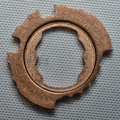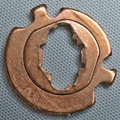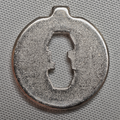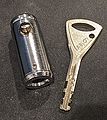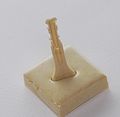Abloy Protec: Difference between revisions
No edit summary |
m (ratings) |
||
| (15 intermediate revisions by 4 users not shown) | |||
| Line 2: | Line 2: | ||
{{Lock model | {{Lock model | ||
|name = Abloy Protec | |name = Abloy Protec | ||
|Img = File:Abloy_Protec_cylinder.jpg | |Img = File:Abloy_Protec_cylinder.jpg | ||
|Img_size = 170px | |Img_size = 170px | ||
|maker = [[Abloy]] | |maker = [[Abloy]] | ||
|lock_design = [[Disc-detainer]], [[Sidebar]] | |lock_design = [[Disc_detainer|Disc-detainer]], [[Sidebar]] | ||
|lock_type = [[Cylinder]] | |lock_type = [[Cylinder]], [[Padlock]] | ||
|years_produced = 2001 - Present | |years_produced = 2001 - Present | ||
|patent = | |ratings = UL 437, EN 1303 | ||
|related = [[Abloy | |patent = Expired 2019 | ||
|related = [[Abloy Disklock]]<br>[[Abloy Exec]]<br>[[Abloy Sento]]<br>[[Abloy Protec2]] | |||
| spec_on = true | |||
| spec_comptype = [[Disc_detainer|Disc-detainer]] | |||
| spec_comp = 9 or 11 | |||
}} | }} | ||
The '''Protec''' is | The '''Protec''' is an EN 1303-rated [[Disc_detainer|disc-detainer]] lock made by [[Abloy]]. The Protec uses nine or eleven discs that interface with a [[sidebar]]. The plug can be turned both directions, making the cylinder suitable for [[Bolt|deadbolt]] locks. One of the main features of the Protec is a "Disc Blocking System" (DBS) that locks discs in place and makes various forms of attack more difficult. | ||
The Protec is considered by many to be one of the best mechanical locks on the market. Videos of certain flaws and defeats have been shown on the Internet, but none have been publicly verified by a reputable source. | |||
The Protec succeeded the [[Abloy Exec]] in the Abloy disc-detainer line. It was replaced, in 2012, by the [[Abloy Protec2]]. | |||
__TOC__ | __TOC__ | ||
<br clear=all> | |||
== Principles of operation == | |||
The Protec works by using angled bitting cuts on the key to properly rotate discs. The key is inserted and rotated 90°; the angled cuts on the key rotate the discs in the lock. If all the discs are rotated to the correct position, the sidebar can fall into the discs and the plug can be rotated. Washers are placed between discs to ensure that the key rotates each disc individually. | |||
<div align="center"><gallery> | |||
File:Abloy Protec key.jpg|A Protec key. | |||
File:Abloy Protec 4-cut disc-EffOr.png |A #4-cut Protec disc. | |||
File:Abloy Protec rear disc-EffOr.png |A disc placed in the bottom or rear of the Protec disc stack. | |||
File:Abloy Protec front disc-EffOr.png |Abloy Protec profile disc. | |||
File:Abloy Protec CL290 discs key-LegSamurai.jpg |Protec discs and key. | |||
File:Abloy Protec CL290 key-LegSamurai.jpg | Abloy CL290 cylinder with Protec key. | |||
File:Abloy Protec CL290 sidebar returnbars-LegSamurai.jpg |Protec sidebar, return bars, and disc controller. | |||
File:Abloy Protec key cuts-EffOr.png |Abloy Protec key used in an industrial cylinder. | |||
</gallery></div> | |||
'''Notes''': | |||
* Protec [[padlock]]s do not use the Disc Controller system but instead use a Disc Steering System (DSS) similar to the one used in the [[Abloy Exec]].<ref>Fey, Han. 2005. [http://toool.nl/images/8/8a/Abloypart3.pdf Evolution of Abloy (part 3)]</ref> | |||
== Key security levels == | |||
The security level of a Protec key defines the availability of key blanks or key duplication. Diamond, the highest level, involves key profiles that can only be obtained from Abloy directly. | |||
; Diamond | |||
: Keys are available directly from Abloy. Full registration information must be provided. | |||
; Ruby | |||
: Each Abloy Protec Centre has its own keyway profile. These profile keys are only available from the original distribution centre. | |||
; Emerald | |||
: Like Ruby level, but the original supplier can provide additional keys. Abloy can provide keys if the original supplier is unknown. | |||
; Sapphire | |||
: Keys can be obtained at any Abloy Protec Centre by providing a [[Security card|key identification card]]. Keycards contain both keyway and indirect bitting information. | |||
== Disassembly instructions == | == Disassembly instructions == | ||
| Line 29: | Line 67: | ||
== Vulnerabilities == | == Vulnerabilities == | ||
The Protec's design enables it to resist a variety of common attacks, particularly lockpicking. | The Protec's design enables it to resist a variety of common attacks, particularly lockpicking. In theory, the Protec is vulnerable to the following: | ||
* [[Lockpicking]] | * [[Lockpicking]] | ||
* [[Impressioning]] | * [[Impressioning]] | ||
* [[Decoding]] | * [[Decoding]] | ||
== Gallery == | |||
<div align="center"><gallery> | |||
File:Abloy Protec key bitting.jpg | |||
File:Impressioning Abloy Protec cast.jpg | |||
File:Impressioning Abloy Protec comp.jpg | |||
</gallery></div> | |||
== References == | == References == | ||
| Line 40: | Line 86: | ||
== See also == | == See also == | ||
* [[Abloy]] | * [[Abloy]] | ||
* [[Disc-detainer]] | * [[Disc_detainer|Disc-detainer]] | ||
* [[Sidebar]] | |||
{{Stub}} | |||
[[Category:Abloy | [[Category:Lock models]] | ||
[[Category:Abloy]] | |||
[[Category:Disc-detainer locks]] | [[Category:Disc-detainer locks]] | ||
[[Category:Sidebar locks]] | |||
[[Category:Padlocks]] | |||
[[Category:UL 437 locks]] | |||
[[Category:EN 1303 locks]] | |||
Latest revision as of 23:41, 25 December 2022
Abloy Protec
| Abloy Protec | |
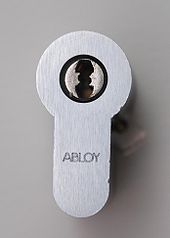 | |
| Name | Abloy Protec |
|---|---|
| Manufacturer | Abloy |
| Lock Type | Cylinder, Padlock |
| Lock Design | Disc-detainer, Sidebar |
| Year(s) Produced | 2001 - Present |
| Security Rating(s) | UL 437, EN 1303 |
| Patent | Expired 2019 |
| Specifications | |
| # of Components | 9 or 11 |
| Component Type | Disc-detainer |
| Related Locks | |
| Abloy Disklock Abloy Exec Abloy Sento Abloy Protec2 | |
The Protec is an EN 1303-rated disc-detainer lock made by Abloy. The Protec uses nine or eleven discs that interface with a sidebar. The plug can be turned both directions, making the cylinder suitable for deadbolt locks. One of the main features of the Protec is a "Disc Blocking System" (DBS) that locks discs in place and makes various forms of attack more difficult.
The Protec is considered by many to be one of the best mechanical locks on the market. Videos of certain flaws and defeats have been shown on the Internet, but none have been publicly verified by a reputable source.
The Protec succeeded the Abloy Exec in the Abloy disc-detainer line. It was replaced, in 2012, by the Abloy Protec2.
Principles of operation
The Protec works by using angled bitting cuts on the key to properly rotate discs. The key is inserted and rotated 90°; the angled cuts on the key rotate the discs in the lock. If all the discs are rotated to the correct position, the sidebar can fall into the discs and the plug can be rotated. Washers are placed between discs to ensure that the key rotates each disc individually.
Notes:
- Protec padlocks do not use the Disc Controller system but instead use a Disc Steering System (DSS) similar to the one used in the Abloy Exec.[1]
Key security levels
The security level of a Protec key defines the availability of key blanks or key duplication. Diamond, the highest level, involves key profiles that can only be obtained from Abloy directly.
- Diamond
- Keys are available directly from Abloy. Full registration information must be provided.
- Ruby
- Each Abloy Protec Centre has its own keyway profile. These profile keys are only available from the original distribution centre.
- Emerald
- Like Ruby level, but the original supplier can provide additional keys. Abloy can provide keys if the original supplier is unknown.
- Sapphire
- Keys can be obtained at any Abloy Protec Centre by providing a key identification card. Keycards contain both keyway and indirect bitting information.
Disassembly instructions
Add to me!
Vulnerabilities
The Protec's design enables it to resist a variety of common attacks, particularly lockpicking. In theory, the Protec is vulnerable to the following:
Gallery
References
- ↑ Fey, Han. 2005. Evolution of Abloy (part 3)
See also
| This article is a stub. You can help Lockwiki by expanding it. |

